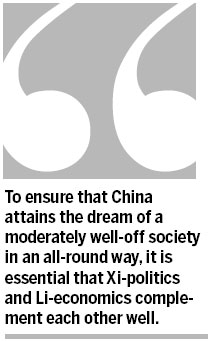Xi-politics and Li-economics complementary
By Chung-yue Chang (China Daily) Updated: 2013-11-11 07:31The political and economic combination of Xi and Li, necessitated and realized, will build on the progress unleashed by the Third Plenum in 1978, which ended China's decades of seclusion with the world-shaking policy of reform and opening-up, and the Third Plenum of 1993, which launched the implementation of a "socialist market economy" that catapulted China into the global economy.

In retrospect it is easy to see that those two plenums were all about experimenting with new economic practices, resulting in a bittersweet experience for China, as the nation had to "cross the river by feeling the stones".
In doing so, over time, China formulated its own "road map," which has not yet been acknowledged. That such a map exists is evidenced by the fact that in the 30 years of reform and opening-up, China has condensed the 300 years of development from the Industrial Revolution to the present and created a modern economy with Chinese characteristics.
When the socialist market economy was established through reform and opening-up, some people in China became rich first, creating a huge income gap between the rich and the poor. Wealthy people have interests and power; interests and power lead to the formation of vested interest groups. The dynamics of these groups through cooperation and competition produce the positive effect of further economic growth but they also have the negative effect of encouraging excess. At the 1978 and 1993 Third Plenums, there were no meaningful indications of the income gap, nor were there any significant signs of excesses. The concern then was how best to enrich some people first and the rest later, by developing the economy quickly and steadily. The problems of conspicuous consumption, waste and hedonism were not as apparent as they are today. But their pervasive and highly visible presence in recent times is the reason why the Xi-politics of elimination are so important today.
With much of the population still poor, enriching people economically will still be the top concern at this year's Third Plenum. But China's development is now at a critical juncture, as it is approaching the end of the manufacturing phase.
To avoid the so-called "middle income trap" China needs to move away from being the factory of the world and become an innovator of the world. That is why there is the need for the Li-economics.
To ensure that China attains the dream of a moderately well-off society in an all-round way, it is essential that Xi-politics and Li-economics complement each other well. To this end they must continue to promote the virtue of wealth creation while eliminating the vices of excess.
The author teaches philosophy at Montclair State University, New Jersey, US.
(China Daily 11/11/2013 page9)











